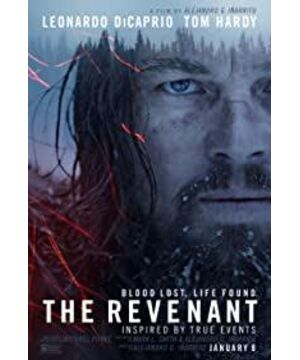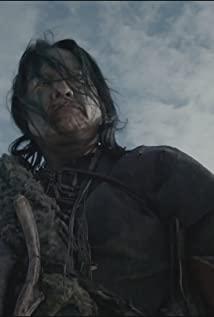The Mexican director Alessandro Gonzalez Inarrido did not send the actor Michael Keaton to the throne of the actor in the last Oscar competition with the rare masterpiece "Birdman" In the second year, the director, who was still working hard, seemed to make up for last year's regrets by taking Leonardo, who had been acting hard but accompany him, under the banner, and "abusive" him even more in the plot setting, in order to be brilliant. Although in the movie, the plot has repeatedly made Leonardo’s Grass, played by Leonardo, to be on the verge of life and death. However, he is still like a “spiritual help” who escaped natural and man-made disasters and finally stood opposite the enemy. , Complete revenge.
1. The historical truth behind natural disasters and man-made disasters. The
protagonist Glass was knocked down by deadly dangers time and time again in the movie. Facing the chase of the Sioux in the Indian tribe, the experienced Glassburn wanted to lead everyone out of the dangerous Rocky Mountains. The mountain returned to a safe area, but was attacked by a bear on the arduous return journey. Although the bear was finally defeated, he almost lost his life. After the unsatisfactory Glass became a burden to the entire team, the captain left two people to take care of him and then allowed more people to return to the base as soon as possible. Glass himself fell in love with a Li woman and had a child. Later, the Li tribe was massacred by the French army, and his wife died in the massacre. Although the only son of the two survived because Glass shot a French captain, his face was also disfigured in the tribal fire. From now on, Glass and his son Hawke depended on each other.
In the process of taking care of Glass, the remaining Fitzgerald wanted to suffocate the powerless Glass while his companion was away in order to get out of the forest as soon as possible. However, Glass's son Hawke discovered his bad intentions. , And because of this, Gerrard was murdered by his own father, who could not resist, and Glass himself could only watch his son die beside him, and then was abandoned by Fitzgerald and another companion.
Glass, who was almost buried alive, finally crawled back to the world like a dead but not stiff grievance. Although he was seriously injured and could die at any time, he was still driven by revenge to return to the world one step at a time and personally. Revenge against Fitzgerald who killed his son.
In the movie, apart from the impressive and extreme natural scenery of the Rocky Mountains, there is also a relationship between people that is colder than nature. During the filming process of the film, due to the director’s requirement to shoot under natural light conditions, the single-day filming time of the entire film was only one hour at a minimum. And behind the seemingly simple revenge story, Glass said The natural and man-made disasters encountered are not only the tragedy of his own destiny as a whole, but also the "negative" products brought about by the historical truth behind him. The white people who were slaughtered in the movie—the seemingly gritty Americans or those who traveled across the ocean to the New World on the “Sweeper” and the French who have always been brainless and somewhat stupid—actually they are The promoters of giving themselves actual destiny, without the white people’s westward march, the Indians themselves had no conflict of interest with them. But when the Indians were expelled from their homes time and time again, these contradictions and conflicts were inevitable. Up. In the film, the Sioux woman and the Li son are represented as images, and their fate of being slaughtered or possessed is written on the wall of history. At this time, the white people also hope to seek faith in the shattered church. Protection, these mixed killing and desire, but did not produce satisfactory results.
Glass himself is more like an alternative product that had to bear this fate. He once fell in love with a Li woman and had a child belonging to each other, but the tribe was destroyed by the French army, although he was trying to protect his family. He shot the French captain, but still failed to save his wife's life. The son and he still had to face a life of displacement. When standing in front of his son and people of the same skin color, he was also distressed and unable to balance.
Fitzgerald, as the back of Glass, he is more like a collection of all people’s desires. His evil is crude, bloody and direct. He is like the panic, questioning, and questioning of the entire white world towards foreign races. The appearance of sin, he has been constantly provoking Glass’s patience, and in the end he stretched out the hand in everyone’s heart to strangle the half-dead Glass, and even ended Hawke’s life with the last knife. He didn't hesitate. He represents all the polite, restrained bloody thoughts and illusionism of the civilized world. In the final battle with Glass, he was eventually taken by the Sioux. It can also be seen that the civilized world itself The animal’s fear and deviation, of course, the rules of the world cannot make it possible to do it yourself. "Release" this animal to "Nature"-that is to say, let Fitzgerald die in the Soviet Union. In the hands of the tribe, it is a restrained and polite approach.
2. God's arrangement? It's better to say that it is inherently destined to
have an old saying in China: good is rewarded for good, evil is rewarded for evil, not not, the time has not come. Glass's Revenge looks like a traditional Chinese story wrapped in minimalist photography and a cruel natural environment. However, behind it, it is inconsistent with the traditional Chinese culture of revenge or a gentleman's revenge is not too late for ten years. Inconsistent, this has a great correlation with our mutual belief settings.
The Chinese belief system is more frequently set with multiple gods. Gods have a variety of choices. Gods are not so much a wish-satisfactory as a product of the projection of ideas, but in our desires, it is more than revenge. Xuehen is more about the desire and aspiration for fulfillment in life. Compared with this Eastern style utilitarian system, the belief system of Western gods hopes to explore more inner corners under the blessing of gods and achieve the function of releasing inner anxiety and worries.
In Glass's call, he called the name of God more than once. He hoped to use the power of faith to achieve not so much revenge as to survive first. Of course, this kind of faith does not distinguish between good and bad in a broad and broad world. Yes, everyone has an equal right to believe, and Fitzgerald also believes in this. However, this is precisely where the God of Faith is fair to people. It seems that he has not responded, and he has given the scepter of hope and struggle to the people who have been entangled in the hand of fate. Glass’s son died at the hands of Fitzgerald, but Fitzgerald was not killed by Glass’s sword. He died like fate at the hands of the Sioux who had cut his scalp. Returning to nature with water is not so much God's arrangement, as it is his own destiny. God will not arrange any destiny or change for anyone alone, because what the world needs is to maintain its original face.
This difference in understanding between different systems also makes "Wild Hunter"-of course I prefer to call it "The Resurrection"-set off a new storm among Chinese audiences, which may be possible in our ethical concepts. It is indeed difficult to understand this kind of resilience and forbearance in pursuing evil for thousands of miles, but it is indeed difficult to understand this new belief system in a deeper level. We can understand hatred, but from a deep-rooted perspective, we actually don’t. I don't quite understand what Glass did in the end to return the fate of the enemy to God. Of course, this does not prevent us from watching this cruel movie that confirms the laws of nature.
Fitzgerald’s inborn destiny may be the silence after his death, while Glass’s inborn destiny is a state that he can never balance himself. The lost wife has always appeared in his hallucinations in two states of life and death. In the middle, the calm joy of life when life flourishes, the love and perfection when two passions are in love, the abruptness when dying, and the repetition after disappearing made this Indian Li ethnic woman a wonderful nightmare for Grasse. She is his every night. The expectation is also the panic every night, because every time he has her, he has to be forced to admit that he has lost her a long time ago. This loss is destined to be destined because the hatred cannot be resolved. . The real she is like a wife, and the ghostly wandering spirit is like his mother. While soothing his sorrow, she must also give him the strength to stand up again to face hatred. When Fitzgerald died, he also It was the time when this past past disappeared. He could only watch the ghost leave his life step by step. At this time, the death or life of Glass was no longer what he cared about. Problem.
A drop of water in the sea, a grain of sand in the desert, this is a fact that we must pay attention to when watching a movie.
In the beautiful and cruel images, although humans are the protagonists, they only occupy a small corner of the Rocky Mountains. Although they have caused waves, they still have to face the sanctions of nature. The Indians are not so much a part of human beings. Rather, they are judges who are fighting on behalf of natural civilization. They judge the world with their own natural values and ethical concepts. When human beings face nature, perhaps the first victor is the so-called civilized world, but when the war hits the end, perhaps We can find that it is ourselves that we have been trying to eliminate. There is no victor in this war.
Finally, congratulations to Leonardo DiCaprio for winning the 88th Oscar for Best Actor, You deserve it!
View more about The Revenant reviews











